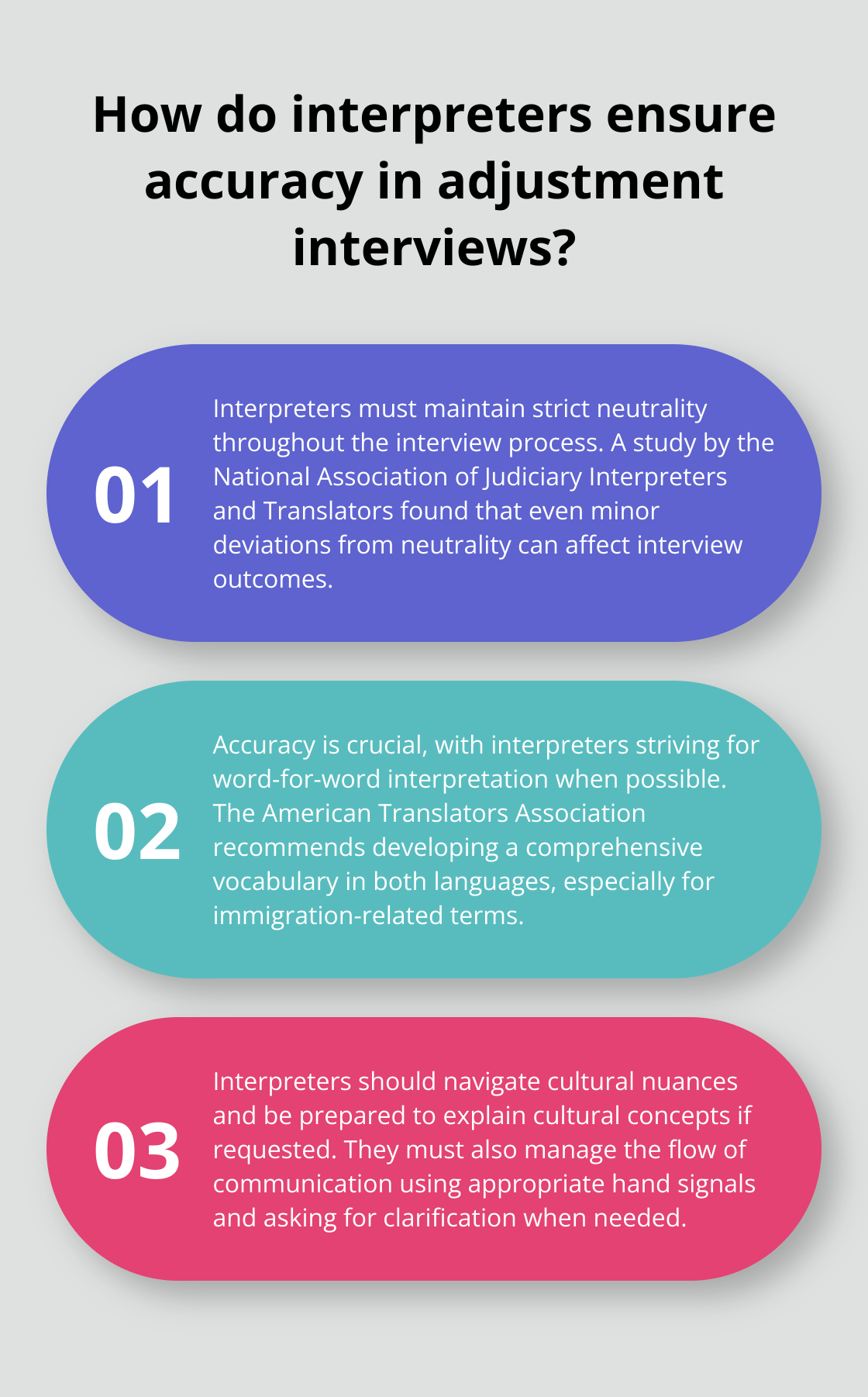
Interpreter Rules for Adjustment of Status Interviews
At Law Offices of Jeffrey A. Thompson, we understand the critical role interpreters play in adjustment of status interviews. These interviews are a pivotal step in the immigration process, and accurate interpretation can make all the difference.
Navigating the rules and requirements for adjustment of status interview interpreters can be complex. This guide will break down the essential guidelines, best practices, and USCIS regulations to help ensure a smooth and successful interview process.
What Are Interpreters in Adjustment of Status Interviews?
Definition of Adjustment of Status
Adjustment of Status allows eligible individuals to apply for lawful permanent resident status (also known as a Green Card) without leaving the United States. This process includes an interview with a USCIS officer, which can challenge non-native English speakers. Interpreters play a vital role in this process.
The Essential Role of Interpreters
Interpreters act as a communication bridge between the applicant and the USCIS officer. They don’t just translate words; they convey meaning, context, and nuance. The Migration Policy Institute identified language barriers as a top challenge for immigrants in the U.S., affecting their ability to access services and navigate legal processes.
Types of Interpreters Permitted
USCIS enforces specific rules about who can interpret during these interviews. Professional interpreters offer the safest choice. In some instances, USCIS may allow friends or family members to interpret, though this practice faces discouragement.
Interpreter Qualifications
USCIS requires interpreters to demonstrate fluency in both English and the applicant’s language. They must be at least 18 years old and cannot serve as the applicant’s attorney or representative.
Impact of Skilled Interpretation
A skilled interpreter can significantly influence the outcome of an adjustment of status interview. Applicants who use professional interpreters often report increased confidence and preparedness during their interviews. This heightened comfort level can lead to clearer communication and potentially more favorable outcomes.

As we move forward, let’s examine the specific USCIS guidelines that govern the use of interpreters in adjustment of status interviews. These rules ensure fairness and accuracy throughout the process.
USCIS Interpreter Requirements
USCIS enforces strict guidelines for interpreters in adjustment of status interviews. These rules maintain the integrity of the process and ensure fair, accurate communication between applicants and USCIS officers.
Age and Language Proficiency
USCIS requires interpreters to be at least 18 years old. This age requirement helps ensure a level of maturity and responsibility necessary for the role. Language proficiency is equally important. Interpreters must demonstrate fluency in both English and the applicant’s native language. USCIS does not conduct formal language assessments, but officers can disqualify interpreters who struggle to convey information accurately.
Prohibited Individuals
USCIS prohibits certain individuals from serving as interpreters. These include:
- The applicant’s attorney or representative
- Witnesses to the application
- Anyone with a stake in the outcome of the case

Family members, while not explicitly banned, are generally discouraged from interpreting due to potential bias. USCIS officers have the discretion to allow or disallow family members on a case-by-case basis.
Required Documentation
Interpreters must complete Form G-1256 (Declaration for Interpreted USCIS Interview). This form is used by the interviewing officer to record the presence of an interpreter that you have provided for your USCIS interview. Interpreters must sign this form under oath, affirming their commitment to these principles. Additionally, interpreters must present a valid government-issued ID to verify their identity.
Professional Interpreters
Working with professional interpreters can significantly impact the outcome of adjustment of status interviews. Professional interpreters are well-versed in USCIS guidelines and can maximize your chances of a successful interview. The Law Offices of Jeffrey A. Thompson strongly recommends using professional interpreters whenever possible to ensure compliance with USCIS requirements.
Interview Preparation
Applicants should inform USCIS in advance if they require an interpreter. This allows the officer to allocate sufficient time for the interview and prepare any necessary accommodations. Applicants should also familiarize their interpreters with the content of their application to ensure smooth communication during the interview.
USCIS officers have the authority to terminate an interview if they believe the interpreter is not meeting the required standards. This can lead to delays and additional stress for the applicant. Therefore, it’s important to choose an interpreter who not only meets USCIS requirements but also has experience with immigration interviews.
The next section will explore best practices for interpreters during adjustment of status interviews, providing valuable insights for both applicants and interpreters to navigate this process successfully.
How to Excel as an Interpreter in Adjustment Interviews
Uphold Neutrality and Accuracy
Interpreters must maintain strict neutrality throughout the interview process. This means they should refrain from offering personal opinions, advice, or explanations. The interpreter’s sole responsibility is to convey the exact meaning of what is said, without additions or omissions.

A study by the National Association of Judiciary Interpreters and Translators found that even minor deviations from neutrality can lead to misunderstandings and potentially affect the interview outcome. To maintain neutrality, interpreters should:
- Interpret in the first person, as if they are the speaker
- Avoid engaging in side conversations with either party
- Refrain from explaining cultural concepts unless specifically asked by the USCIS officer
Accuracy is equally important. Interpreters must strive for a word-for-word interpretation whenever possible. If a direct translation isn’t feasible, they should try to convey the closest possible meaning. The American Translators Association recommends that interpreters develop a comprehensive vocabulary in both languages, particularly terms related to immigration law and procedures.
Navigate Cultural Nuances
Cultural differences can present significant challenges in interpretation. Idioms, colloquialisms, and culturally specific references may not have direct equivalents in the target language. In such cases, interpreters must find ways to convey the intended meaning accurately.
For example, the American phrase “it’s raining cats and dogs” doesn’t translate literally in most languages. A skilled interpreter would convey the meaning of heavy rainfall without using the exact idiom.
To handle these situations effectively, interpreters should:
- Familiarize themselves with common idioms and cultural references in both languages
- Be prepared to provide brief explanations of cultural concepts if requested by the USCIS officer
- Stay updated on current events and societal norms in both cultures
Manage the Flow of Communication
Effective interpreters must also manage the pace and flow of the interview. This involves:
- Using appropriate hand signals to pause speakers when necessary
- Asking for clarification when needed, without engaging in extended dialogues
- Maintaining a consistent speaking pace to ensure all parties can follow the conversation
Prepare for Technical Terms
Adjustment of status interviews often involve complex legal and immigration-related terminology. Interpreters should prepare by studying relevant vocabulary and concepts beforehand. The Executive Office for Immigration Review provides a glossary of immigration terms that can serve as a valuable resource.
Interpreters should also familiarize themselves with common acronyms used in immigration proceedings (such as USCIS, DHS, and ICE). Being well-versed in these terms helps ensure smooth and accurate interpretation throughout the interview.
Maintain Professionalism
Professional conduct is paramount for interpreters. This includes:
- Dressing appropriately for a formal setting
- Arriving early to complete necessary paperwork and prepare mentally
- Maintaining a calm and composed demeanor throughout the interview
Final Thoughts
Adjustment of status interview interpreters play a vital role in ensuring clear communication between applicants and USCIS officers. These interpreters must adhere to strict guidelines, which cover language proficiency, age requirements, and necessary documentation (such as Form G-1256). Their ability to accurately convey not just words, but also context and cultural nuances, significantly impacts the interview outcome.

Professional interpreters often contribute to more favorable results in adjustment of status interviews. They help applicants present their cases clearly and allow USCIS officers to make informed decisions. The success of these interviews frequently depends on the quality of communication facilitated by skilled interpreters.
We at Law Offices of Jeffrey A. Thompson understand the complexities of the immigration process, including the importance of qualified interpreters. Our expertise in immigration law enables us to guide clients through every step, from paperwork to interview preparation. We strive to help our clients overcome legal hurdles as they work towards achieving their American dreams.


